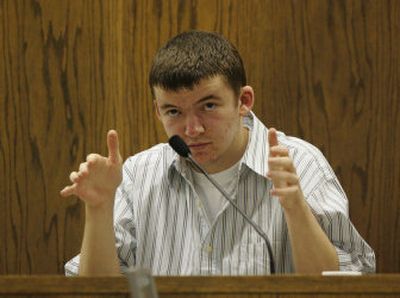Killing suspect says victim fell from tree

EPHRATA, Wash. – A teenager accused of killing a playmate more than three years ago stuck to his story Wednesday when he took the stand in his own defense, saying he left the victim injured on the ground after a fall from a tree and never attacked him.
Evan Savoie, now 15 but just 12 years old at the time of the killing, is among the youngest murder defendants in the state to be tried as an adult. He is accused of the Feb. 15, 2003, slaying of 13-year-old Craig Sorger, a developmentally disabled boy who was found beaten and stabbed to death in a recreational vehicle park in Ephrata.
Another playmate, Jake Eakin, already has testified against Savoie. He previously pleaded guilty to second-degree murder by complicity and is serving 14 years.
The defense claims someone else must have killed Sorger.
Families for all three boys were in court Wednesday. The defense rested shortly after Savoie’s testimony, and closing arguments were scheduled for 9 a.m. today. If convicted, Savoie faces more than 20 years in prison.
Savoie testified for more than two hours Wednesday in Grant County Superior Court, describing how he left Sorger injured on the trail after a fall from a tree. Savoie said he checked for a pulse, but found nothing, and left without seeking help. But he did not beat him, he said without emotion.
“I can’t say why. I can’t explain it,” Savoie said when asked why he didn’t call for help, noting that he had ample time and many opportunities. Looking back, he said he feels bad.
“Craig never would have been beaten, never would have been stabbed,” he said. “Everybody’s life would be different.”
Asked by his own attorney how often he had lied to authorities, Savoie conceded he had lied twice: the day Sorger died, when he said he and Eakin had left him playing in the park, and again when he said his sweater had been stolen.
Instead, he said, he left the sweater in a pond after trying to wash Sorger’s blood from it.
Prosecutor John Knodell countered that Savoie had changed his story several times, including the position of Sorger’s body when he fell from the tree.
He also repeatedly asked Savoie about the first story he and Eakin gave authorities. Saying they had last seen him playing in the park would only work, Knodell said, if Sorger was not around to tell the truth.
“You knew that Craig was not going to be able to get up and tell people what really happened?” Knodell asked.
“I did not know that, no,” Savoie replied.
“If Craig had lived, he could have told everyone what really happened?” Knodell asked again.
“Probably so, yes,” Savoie said.
Eakin testified earlier in the trial that Savoie hit Sorger in the back of the head with a “basketball-sized” rock, then struck him repeatedly.
But Savoie described in detail how the three boys played tackle tag in a grassy field before heading to a wooded area to build a fort. In searching for sticks for the fort, Sorger began climbing a tree but appeared to reach for something and lost his balance, Savoie said.
At one point, Savoie stepped down from the stand to show the jury how Sorger moved and then fell. Jury members leaned forward in their seats to listen.
“He wasn’t holding onto anything. As quick as he went up, he just fell,” Savoie said, speaking quickly. “When he was falling, it was quick. All I saw was him fall back and hit the ground.”